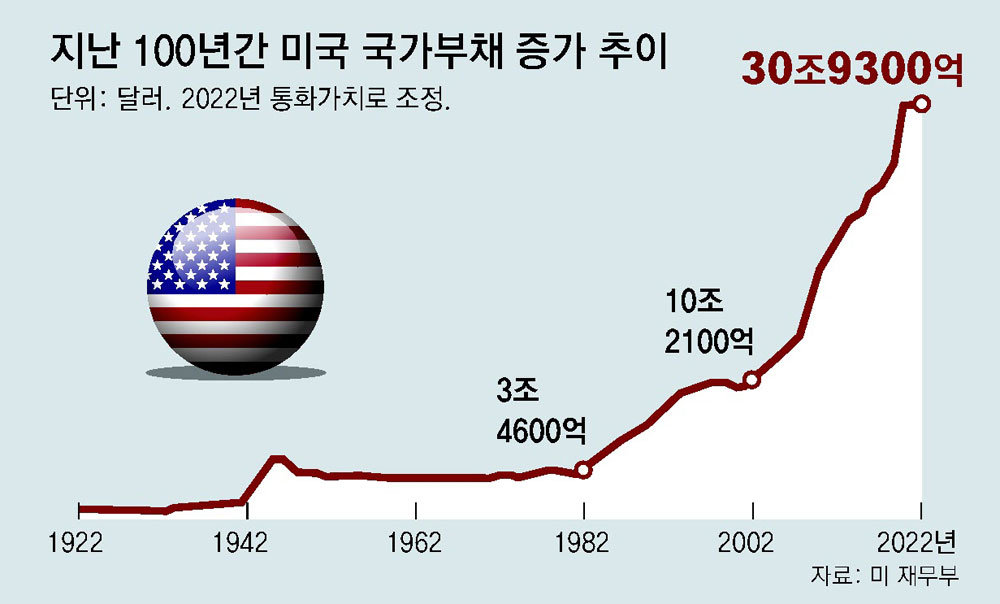Despite Yellen Treasury’s “June 1 Bankruptcy” Warning
Government-Republican party unable to find ‘debt limit’ junction
Failure to pay interest on US Treasuries amid banking crisis
Financial market turmoil such as stock price decline is inevitable
“If the United States falls into default (national default), it will have a serious impact on the world economy.” (International Monetary Fund, IMF Spokesperson Julie Kozack)
“We convened a ‘war room’ in response to the risk of US bankruptcy.” (Jamie Dimon, Chairman of JP Morgan)
The IMF and JP Morgan Chase warned one after another that a disaster could come to the world economy as the Joe Biden administration and the Republican Party continue to fail to find a point of contact in the national debt ceiling negotiations, and concerns that a default situation may become a reality grow. did. If the Treasury, which is running out of money, is going to pay more debt, Congress will have to approve a higher ‘debt ceiling’, as the two sides continue to run parallel lines.
Initially, in the market, there were many prospects that if the debt ceiling was not raised, the emergency fund of the US Treasury would run out around August, and there would be an ‘X-date (bankruptcy day)’ in which not only salaries of civil servants and soldiers, but also interest on government bonds could not be paid. However, due to the slowdown in the U.S. economy, taxes were collected less than in previous years, and Treasury Secretary Janet Yellen warned, “June 1 will be a state of bankruptcy.” Chairman Dimon also expressed a sense of crisis in an interview with Bloomberg TV, saying, “From the 21st, we will hold an emergency management meeting, which is the meaning of the exhibition situation room (war room), three times a day.”
If President Biden and House Speaker Kevin McCarthy of the Republican Party continue to drag out negotiations on the upper limit of the debt, and a default situation actually occurs even one or two days later, even if an agreement is reached belatedly, the impact on the world economy will be enormous. It is easy to think of the ‘Legoland Incident’ in Korea last October. The entire Korean bond market almost collapsed when Gangwon-do, which provided payment guarantees, raised its hands to settle the debt (bill) of Legoland. If the United States, the world’s largest economy, falls into insolvency, the repercussions will be catastrophic.
Since U.S. Treasuries are safe enough to be considered risk-free, they are the benchmark for prices and interest rates of all kinds of financial assets. If the risk of default in U.S. Treasury bonds rises, the risk level of overall assets such as corporate bonds and mortgage-backed securities rises, causing interest rates to skyrocket and asset prices to plummet. In the aftermath, the cost of borrowing for the government, households, and businesses rises, reducing investment and consumption, and rapidly shrinking the economy. The U.S. Congressional Budget Office said, “If the Democratic Party and the Republican Party continue their confrontation at the brink, the U.S. economic growth rate in the third quarter (July-September) could drop to -0.3%, short-term default to -0.6%, and long-term default to -6.1%. ” he warned.
Because of this risk, there is no precedent in the United States where the administration and Congress reached an agreement over the upper limit of the debt limit, but eventually reached an agreement and a national bankruptcy occurred.
In August 2011, during the Obama administration, Congress agreed to the ceiling on the debt ceiling after a last-minute confrontation, but the global credit rating agency Standard & Poor’s (S&P) downgraded the US national credit rating by one notch from AAA to AA+ for the first time in history. S&P said it downgraded the rating not only because of the sharp rise in US debt, but also because of the political risks it showed during the debt ceiling negotiations. That year, US federal government borrowing costs increased by 1.3 billion dollars (approximately 1.734 trillion won), global stock markets plummeted, and the value of currencies in emerging countries also declined due to the preference for safe assets.
At the time, the Korean market also took a direct hit. According to the Samsung Economic Research Institute, the rate of decline in the Korean KOSPI from August 1 to 15 of that year was 17.4%, which was larger than the US Dow (-5.4%). The value of the won against the dollar also declined by 2.6% over the same period.
Compared to the 2011 U.S. credit rating downgrade, the current vulnerability of the global economy, including the U.S., is exacerbating concerns. Four U.S. banks have already collapsed, unable to cope with asset losses due to a rise in interest rates following inflation, and the debt crisis in emerging countries is also serious globally. With markets already vulnerable in the aftermath of the banking crisis, the possibility of a US default could incite fear even more.
Wendy Edelberg, an analyst at the Brookings Institution, said, “Worries about a possible US default could cause significant disruption in financial markets. will continue,” he pointed out. IMF spokeswoman Julie Kozak also urged the U.S. government and Congress to reach an agreement, saying, “The U.S. default would add a shock to the world economy, which is already struggling with the pandemic and the war in Ukraine.”
New York =
Source: Donga
Mark Jones is a world traveler and journalist for News Rebeat. With a curious mind and a love of adventure, Mark brings a unique perspective to the latest global events and provides in-depth and thought-provoking coverage of the world at large.

